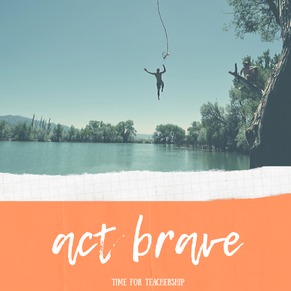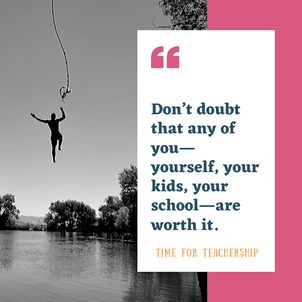|
Change is hard work. It takes a healthy dose of bravery to do something you haven’t tried before. You know you have survived so far by doing things a certain way, so you may be thinking, “Why would I risk things getting worse?” So why should you take the leap? Because things can get better. You, your students and your school are all worth finding out. Angela Watson ends each Truth for Teacher podcast with the phrase, “I’m not telling you it's going to be easy, I'm telling you it's going to be worth it.” That sums it up nicely. Consider the transformative idea that brought you to this blog. Was it the chance for less stress in your daily work habits? The chance to have an actual weekend, free from schoolwork? Was it the desire to invest more time in yourself and your professional growth? Was it the opportunity to transform your school into one where teachers and students have a real say in what you do and how you do it? Was it the dream of a school that achieves racial and gender equity and commits social justice activism? Don’t doubt that any of you—yourself, your kids, your school—are worth it. You are worth taking that chance that school could be better. Now, maybe you are totally on board with the idea of worth, but you’re wary of the outcome. You might be thinking, why should I trust this is a good investment of my time? Glad you asked. Here’s what compelled me to take the plunge: Why streamline planning to make time for professional growth? John Hattie’s (2018) research found collective teacher efficacy is the number one influence on student achievement. CTE is when teachers collectively believe they can positively impact student learning for all students and this is confirmed by data. CTE (d=1.57) has 2x the impact on student learning as feedback (d=0.72), and almost 3x the impact of classroom management (d=0.52). Many schools already embed collaborative professional learning (i.e., staff PD, PLCs, department/grade team meetings) into the school day, so you are likely already doing some of this. Unfortunately, lots of school PD is not personalized to your content/context, collaborative, job-embedded, and ongoing. Consequently, research has shown that many PD initiatives appear ineffective in supporting changes in teacher practices and student learning (Learning Policy Institute, 2017). So, especially if the school-wide PD is not doing it for you, identify an area for your own growth, seek out research on the topic, or visit colleague’s classrooms that excel in this area. Building up your individual efficacy can strengthen CTE and vice versa (Hoy, Sweetland, & Smith, 2002). But, as a teacher, why should I stop grading each student worksheet? To clarify, I don’t think you need to completely stop grading worksheets, but ask yourself why you’re grading each worksheet. Is it to let students know how they’re doing? Could you instead provide feedback during class time, in a weekly 1:1 conference? Might students understand your feedback better if it was in the moment or spoken face-to-face? Is it so kids can take their graded work back to their families and let them know how they are doing in class? Is there a better way to do this? Have students journal (in writing or via audio/video recording) for 5 minutes a day or once a week on the feedback they received during class. This way, students are writing all of those comments, saving you time and helping them internalize their strengths and areas for growth! Multiple studies have shown that mastery-based or standards-based grading systems improve students’ academic performance. Here’s what that could mean for your practice: If a homework/classwork assignment is being graded for a non-academic skill, like work habits, just check off that they completed it. If it’s classwork, this can be done in class as they work. By giving students feedback in lieu of grades on formative assessments, you provide opportunities for revision and consequently, skill development. Haystead and Marzano (2009) found teachers who measured skill growth over time on mastery rubrics noted a 34% gain in student achievement. (Read this paper for more information on standards-based grading.) As an administrator, why would I release control of the school to teachers and students? Firstly, the evidence points towards a positive relationship between distributed leadership, organizational improvement and student achievement (Hallinger & Heck, 2009; Leithwood & Mascall, 2008). When people feel supported and valued, they are more likely to work towards collective goals (Carson, Tesluk, and Marrone, 2007). So, involving students and teachers in school governance is in the best interest of the school itself. Secondly, there are individual benefits for those who participate as leaders in the school. Dana Mitra’s (2018) review of student voice research found students who participated in these initiatives had improved agency, competence, civic efficacy, academic performance, and relationships with peers and adults. For teachers, taking on leadership roles in the school is a powerful opportunity for professional growth. It also improves teachers’ working relationships (Seashore Louis, Leithwood, Walhstrom, & Anderson, 2010). Finally, it gives administrators more time to focus on other important tasks. Why should I rock the boat and raise racial and gender equity as points of concern? The reality is our existing educational systems are not adequately serving our students of color. (The 2016-17 U.S. graduation rates for Latinx (80), Black (77.8), and American Indian (72.4) students were all around 10 percentage points lower than white students’ graduation rate of (88.6) (National Center for Educational Statistics). Black girls in the US are disproportionately targeted by school dress codes and experience victim blaming from their teachers. Too many high schools ban hair wraps or other head coverings and regulate skirt/short length and clothing tightness. As an interviewee for this Independent article stated, “Any adult sexualising girls’ bodies by policing their clothing is problematic for students and results in negative academic, social and emotional effects on students. Too often girls recounted stories about administrators implying that girls are inviting sexual harassment because of what they are wearing. Not only is this blaming the victim, it also communicates to boys or other harassers that they are not responsible for their own behaviour.” In a study of urban and rural schools in the U.S., 1.8% of youth identified as transgender. About 2 out of every 100 students. Transgender youth reported significantly increased rates of depression, suicidality, and victimization compared to their cisgender peers (The Trevor Project). School-specific statistics show 75.1% of transgender students feel unsafe at school because of their gender expression, and 63.4% of transgender students avoid bathrooms (Gender Spectrum). It is our responsibility to all students to take action against systemic racism, xenophobia, sexism, and transphobia. All educators’ voices are needed in this struggle. We can take steps to deepen our understanding of systemic racism and institutional sexism and explore ways we can disrupt educational inequity. Debra Meyerson’s book, Rocking the Boat: How Tempered Radicals Effect Change Without Making Trouble, is a great read if you are interested in tackling the “rocking the boat” aspect of this question. If taking a public stand is too much at first, Meyerson offers ideas for quiet resistance, such as: psychological resistance (e.g. “armoring”), self-expressions (e.g. dress, classroom decor, leadership style), and behind-the-scenes actions (e.g. work with a community-based organization on education issues, mentor and encourage others to “stay in the game, even when it looks hopeless,” channeling information and resources for those who don’t have access). Taking these actions can be self-affirming, connect you with similarly-minded educators, and produce ripples that lead to additional change. Karl Weick refers to this rippling as “deviation amplification,” so your action “sets the stage for others like it to follow,” (Meyerson, 2008, p. 44). What if staff or family members are uncomfortable with social justice activism projects? As a school (or as a class, if you’re asking from the perspective of an individual teacher), you want to decide who your community will be. Clearly state your community values and communicate those to all school stakeholders. If family members struggle with social justice topics, invite them into your school, share class activities/videos/readings with family members so they can explore what students are learning alongside their kids. Support teachers by helping them prepare for difficult conversations with family members who struggle to see the value in learning about or taking actions towards social justice. Back teachers up when they tackle difficult topics with students, reiterate those school values. When the going gets tough, and it likely will, re-read the previous question and answer to remind yourself and your school community why we push for justice and educational equity: we are here to help all students learn, grow, and lead their communities responsibly. Phew, that was a lot! In summary, remember you are capable and worthy of acting brave. The current state of education is not just working for many students and many teachers. It can get better. We just have to work for it. Take one brave step today. It can be small! And go ahead and share this blog post with a friend, colleague, or loved one who is ready to take action with you.
0 Comments
Leave a Reply. |
Details
For transcripts of episodes (and the option to search for terms in transcripts), click here!
Time for Teachership is now a proud member of the...AuthorLindsay Lyons (she/her) is an educational justice coach who works with teachers and school leaders to inspire educational innovation for racial and gender justice, design curricula grounded in student voice, and build capacity for shared leadership. Lindsay taught in NYC public schools, holds a PhD in Leadership and Change, and is the founder of the educational blog and podcast, Time for Teachership. Archives
May 2024
Categories |




 RSS Feed
RSS Feed